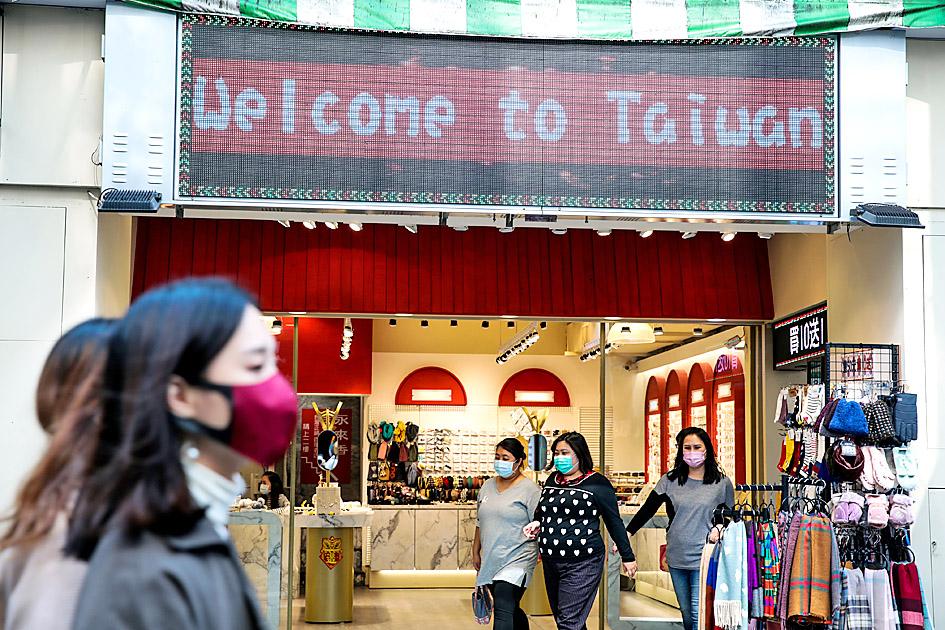More than 60 percent of local retail stores plan to expand their business scale this year as sales are likely to pick up further after a mild increase last year, despite the COVID-19 pandemic, CBRE Taiwan said in a report on Friday.
Sixty-three percent of retail stores expressed their intention to revive expansion plans that ran aground last year because of the COVID-19 outbreak and 44 percent plan to bolster sales over the Internet, it said.
Retail sales last year edged up 0.2 percent to NT$3.86 trillion (US$136.22 billion), as the nation’s effective control of the virus made a quick recovery possible in the second quarter, CBRE analyst Man Chan (陳頌民) said in the report.

Photo: Bloomberg
Based on the firm’s survey of retail investment in the Asia-Pacific region, Taiwan’s investment interest is much healthier than the regional average at 49 percent, the report showed.
Still, 30 percent of local stores said they would put off expansion plans — lower than 39 percent elsewhere — according to the survey, whose respondents include restaurants, supermarkets, entertainment facilities, as well as cosmetics and fashion stores.
More than 50 percent of retail stores abandoned expansion plans after seeing their revenue shrink by a double-digit percentage at the height of the pandemic in April last year, Chan said.
However, many have become active again in searching for expansion sites, encouraged by a correction in rental fees and the nation’s healthy economic outlook, he said.
The Directorate-General of Budget, Accounting and Statistics on Saturday raised the nation’s economic growth forecast to 4.64 percent for this year, a new high since 2014, and predicted that private consumption would increase 3.74 percent, reversing a 2.37 percent decline last year.
Retailers would also seek to tap into e-commerce, as online retail sales last year totaled NT$341.8 billion, surging 19 percent from a year earlier, backed by a low-contact economy, while 77 percent of local eateries plan to improve food delivery offers in light of surging credit-card spending for food delivery services, CBRE analyst Ping Lee (李嘉玶) said in the report.

Hon Hai Precision Industry Co (鴻海精密) yesterday said that its research institute has launched its first advanced artificial intelligence (AI) large language model (LLM) using traditional Chinese, with technology assistance from Nvidia Corp. Hon Hai, also known as Foxconn Technology Group (富士康科技集團), said the LLM, FoxBrain, is expected to improve its data analysis capabilities for smart manufacturing, and electric vehicle and smart city development. An LLM is a type of AI trained on vast amounts of text data and uses deep learning techniques, particularly neural networks, to process and generate language. They are essential for building and improving AI-powered servers. Nvidia provided assistance

DOMESTIC SUPPLY: The probe comes as Donald Trump has called for the repeal of the US$52.7 billion CHIPS and Science Act, which the US Congress passed in 2022 The Office of the US Trade Representative is to hold a hearing tomorrow into older Chinese-made “legacy” semiconductors that could heap more US tariffs on chips from China that power everyday goods from cars to washing machines to telecoms equipment. The probe, which began during former US president Joe Biden’s tenure in December last year, aims to protect US and other semiconductor producers from China’s massive state-driven buildup of domestic chip supply. A 50 percent US tariff on Chinese semiconductors began on Jan. 1. Legacy chips use older manufacturing processes introduced more than a decade ago and are often far simpler than

STILL HOPEFUL: Delayed payment of NT$5.35 billion from an Indian server client sent its earnings plunging last year, but the firm expects a gradual pickup ahead Asustek Computer Inc (華碩), the world’s No. 5 PC vendor, yesterday reported an 87 percent slump in net profit for last year, dragged by a massive overdue payment from an Indian cloud service provider. The Indian customer has delayed payment totaling NT$5.35 billion (US$162.7 million), Asustek chief financial officer Nick Wu (吳長榮) told an online earnings conference. Asustek shipped servers to India between April and June last year. The customer told Asustek that it is launching multiple fundraising projects and expected to repay the debt in the short term, Wu said. The Indian customer accounted for less than 10 percent to Asustek’s

Gasoline and diesel prices this week are to decrease NT$0.5 and NT$1 per liter respectively as international crude prices continued to fall last week, CPC Corp, Taiwan (CPC, 台灣中油) and Formosa Petrochemical Corp (台塑石化) said yesterday. Effective today, gasoline prices at CPC and Formosa stations are to decrease to NT$29.2, NT$30.7 and NT$32.7 per liter for 92, 95 and 98-octane unleaded gasoline respectively, while premium diesel is to cost NT$27.9 per liter at CPC stations and NT$27.7 at Formosa pumps, the companies said in separate statements. Global crude oil prices dropped last week after the eight OPEC+ members said they would